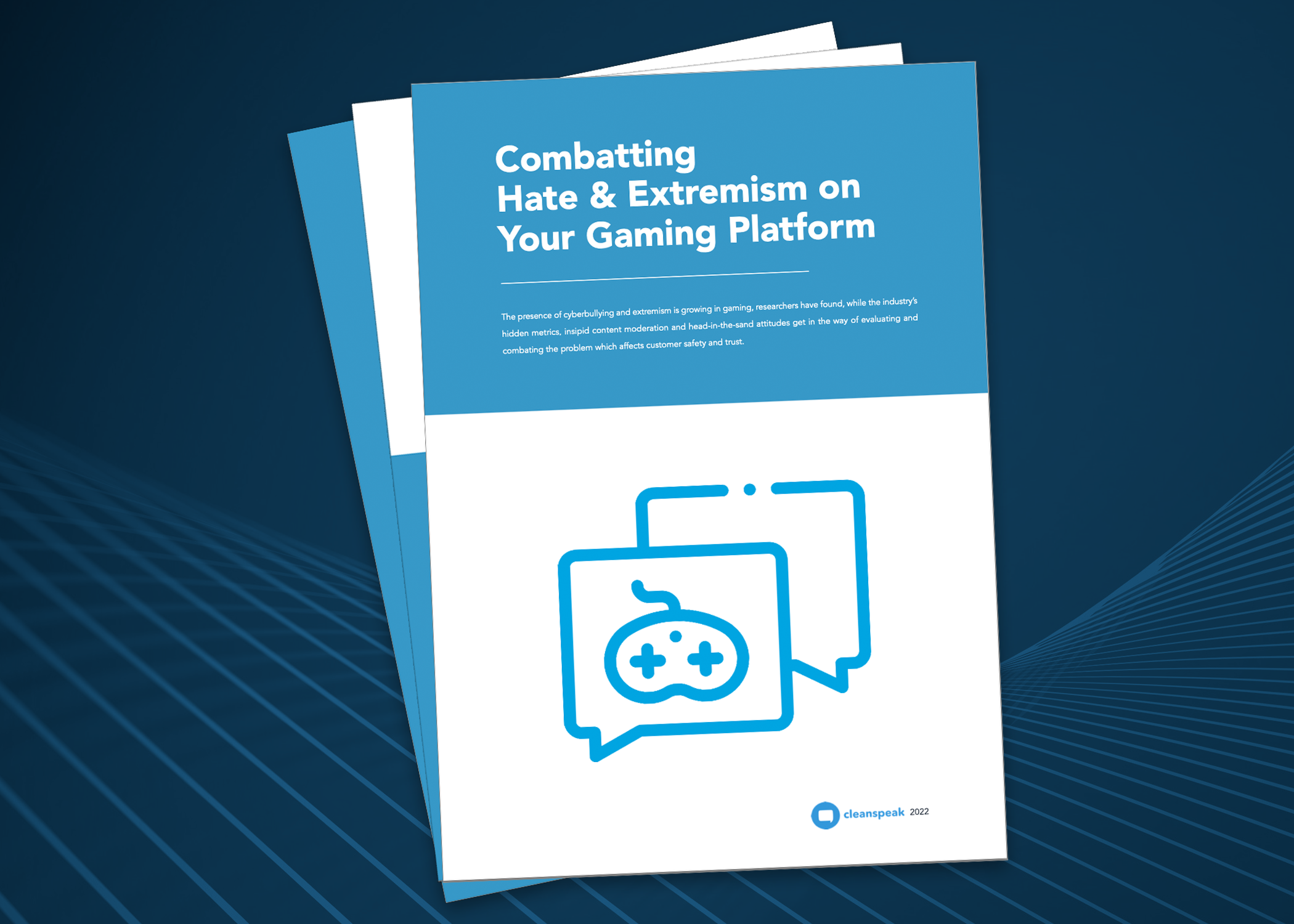
When you are building a game of any sorts, there is bound to be content generated by users. It can either arise from their activity, their progress or play a bigger role as a playable piece of content, such as maps, items, etc. In any case, you need to moderate the content that users generate and put into your games. In this guide, you will share some best practices for moderating and managing user-generated content (UGC).
Continue reading →

The following is an excerpt from CleanSpeak’s new whitepaper: Combatting Hate & Extremism on Your Gaming Platform. The link to the full whitepaper can be found at the bottom of the article.
Continue reading →
 It may seem harmless to see your child engaged in the latest social media application. She may be snapping pictures to her friends on Snapchat or posting funny status updates on Facebook to stay in touch with her classmates and friends. However, when social media posts and tweets take a turn for the worse, your child may experience the devastating effects of cyber bullying, ultimately damaging her self confidence, self esteem and mental well being.
It may seem harmless to see your child engaged in the latest social media application. She may be snapping pictures to her friends on Snapchat or posting funny status updates on Facebook to stay in touch with her classmates and friends. However, when social media posts and tweets take a turn for the worse, your child may experience the devastating effects of cyber bullying, ultimately damaging her self confidence, self esteem and mental well being.
Defining Cyber Bullying
According to Dr. Kate Roberts, Boston-based psychologist and cyber bullying expert, cyber bullying is the use of technology to harass, hurt, embarrass, humiliate or intimidate another person. “Targets are the same students who are bullied in person,” says Roberts. “They are vulnerable, have difficulty reading social cues and they are often alone and socially isolated.”
Continue reading →
There’s probably no better testimony to the power of social-emotional learning than this UK student’s poem about what happens to the “bully” when victimizing someone else (don’t miss this 1:25 min. video of Garrett reading his poem). Garrett was a student at New Line Learning Academy in Maidstone, Kent, UK, when he read this poem in 2011 (he may still be, since it’s a school for students aged 11-18). His poem reflects the healing that comes from the awareness and resilience that social-literacy training develops.
His school adopted school-wide social-emotional learning guided by an SEL program called The Ruler Approach based at Yale University’s Center for Emotional Intelligence. Staff there posted this video on YouTube, reporting that, “after reading this poem in public, Garret received a standing ovation from his class, and the bullying ceased.” If educators are considering showing video for class discussion on bullying or peer victimization, consider this one rather than any video purely about victimization, which can be demoralizing and can suggest to students that social cruelty is “normal.” Social norms research shows that when people understand that negative behaviors aren’t actually something that most people or “members of our school community” engage in, whatever negative behaviors there are decrease even more.
Continue reading →

I keep seeing research evidence that “what goes around, comes around” online too. We think of it as common sense in the face-to-face world, but it’s becoming pretty evident online too. There’s safety in respect for self and others wherever it’s shown, including in digital spaces. Here are three examples in the research, starting with a recently released study:
Positive Begets Positive Online Too
The latest is a study released by Michigan State University researchers who found that “positive online comments can help blunt cyberbullying.” The question that led the press release was: “Want to stop cyberbullying on Facebook? Try using … Facebook.” But certainly not just in Facebook; that’s just where the research was done. If you want positive behaviors from others, be positive. We kind of knew that, right? I’m not being sarcastic in any way, just noting what we’re seeing more and more in the research: that online reflects offline, and there’s an ethic of reciprocity that works in all spaces. The social norms and common sense we humans have been developing for thousands of years apply in this new “space” into which human relations spill over and play out too. “We’ve established with our research that anti-cyberbullying messages that are framed in a negative way are not getting kids’ attention,” said one of the MSU researchers, Asst. Prof. Anna McAlister. This is good advice for the online safety field too.
Continue reading →





 It may seem harmless to see your child engaged in the latest social media application. She may be snapping pictures to her friends on Snapchat or posting funny status updates on Facebook to stay in touch with her classmates and friends. However, when social media posts and tweets take a turn for the worse, your child may experience the devastating effects of cyber bullying, ultimately damaging her self confidence, self esteem and mental well being.
It may seem harmless to see your child engaged in the latest social media application. She may be snapping pictures to her friends on Snapchat or posting funny status updates on Facebook to stay in touch with her classmates and friends. However, when social media posts and tweets take a turn for the worse, your child may experience the devastating effects of cyber bullying, ultimately damaging her self confidence, self esteem and mental well being.
